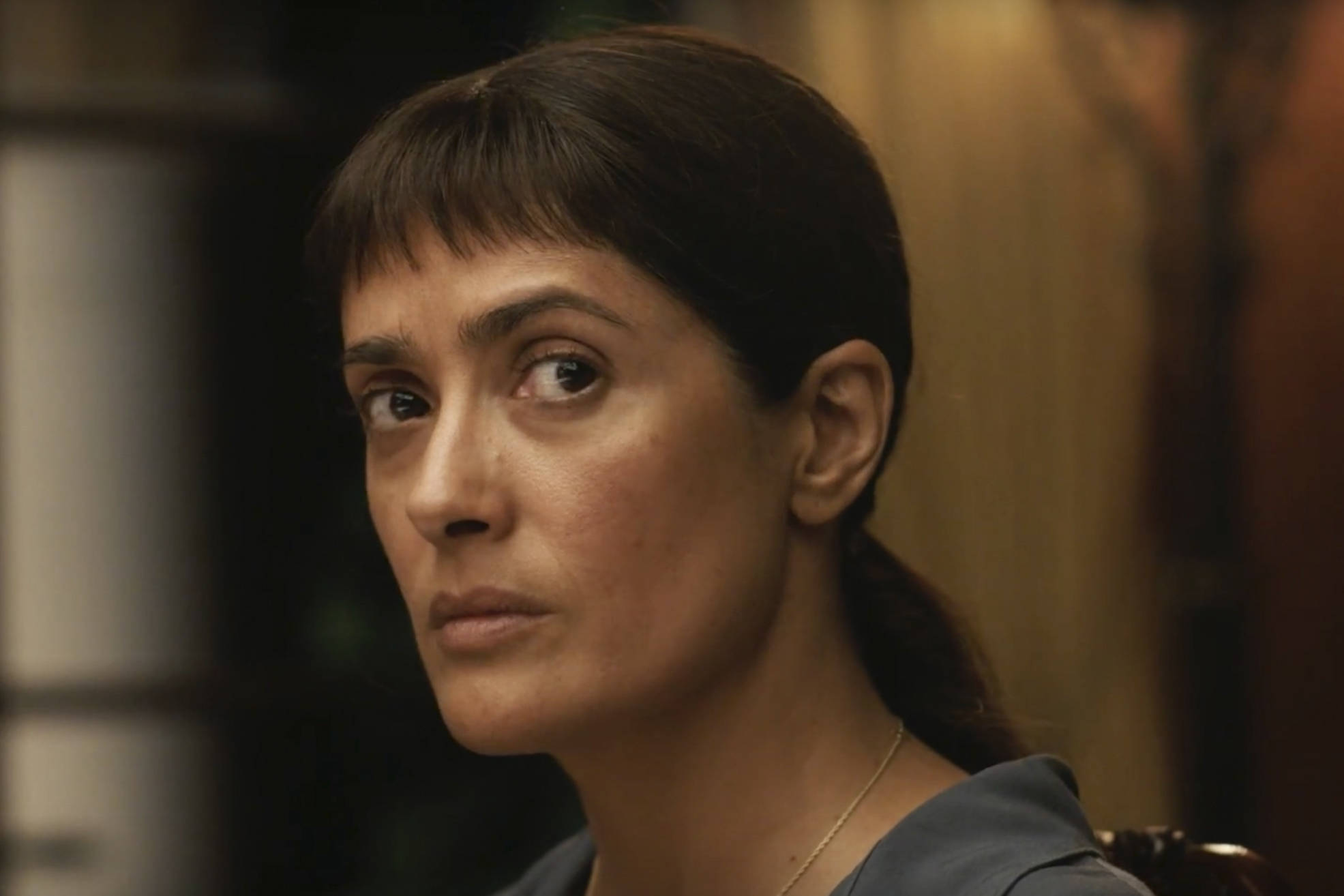In Beatriz at Dinner, Salma Hayek’s face is cleansed of glamour. But even more noticeable is the expression she wears: empathetic yet often empty, as though a life of being around affluent people had trained her character to wear a mask of watchful neutrality. This is apt, because she plays Beatriz, a Mexican immigrant who works as a holistic healer in Hollywood—her clients are the very rich, albeit the kind who believe in mind-body interventions and shamanism. Beatriz’s poker face is all the more impressive because her brand of medicine requires her to take on the pain of her patients, rendering her something like an old-fashioned saint.
Or maybe she’s a crackpot. The movie leaves that one open to conjecture, which is one of the ways Beatriz at Dinner works its darkly playful spell. In their third big-screen collaboration (after Chuck & Buck and The Good Girl), screenwriter Mike White and director Miguel Arteta create a perverse little mood-bender designed to deny audience expectations. If you hear the one-line description of it, you might anticipate a certain kind of politicized drama: After her car breaks down during a home visit with chi-chi clients, Beatriz is invited to stay for dinner, thus locking horns with a racist, egotistical real estate magnate. We will, of course, root for Beatriz in this David-and-Goliath duel, and presumably, the tycoon will get his just deserts by the end of the picture. With the fat cat obviously inspired by Donald Trump, our viewing experience might feel predetermined.
Except it doesn’t play out that way. White and Arteta are after something other than an evening of easy point-scoring. (Compared to the New York production of Julius Caesar featuring an emperor made to resemble Trump, I’d say the Trump substitute in Beatriz gets off easy.) The restraint is what makes Beatriz memorable, as the film searches for compassion and human connection in a world of buzzwords and conspicuous consumerism.
Beatriz is ministering to Cathy (a spot-on Connie Britton) in the expensive, hideous mansion Cathy shares with her husband, Grant (David Warshofsky), a place safely tucked away in a gated community. In the past, Beatriz helped their daughter, a cancer patient, so she and Cathy have a bond they are fond of calling mystical. Guess who’s coming to dinner? Grant’s partner on a big real estate development, a legend in the biz named Doug Strutt (John Lithgow), who arrives on the arm of his most recent wife (Amy Landecker). Also in attendance is Grant’s business partner (Jay Duplass, as young jackass) and his overly indulgent wife (Chloë Sevigny). The self-congratulatory righteousness is palpable as these folks generously allow a poor immigrant to join them at the table.
As they celebrate a land deal that will have a disastrous effect on its community, Beatriz gulps down the free-flowing wine. She can’t stop blabbing and starts asking uncomfortable questions of the cigar-sucking, whisky-swilling magnate—a role Lithgow wisely plays as a man, not a monster. In opposition, Salma Hayek has never been better. Just as Arteta drew out the poignancy lurking inside Jennifer Aniston in The Good Girl, here he lets Hayek be absolutely still and sad (that the actress looks at least a foot shorter than anybody else on screen increases this effect). There are “gotcha” moments during this, yet Hayek lets us notice along the way that Beatriz herself is rather odd.
The movie prepares us for catharsis, but this proves to be a fake-out. Instead, a less satisfying and more haunting finale awaits. I’ve always liked Arteta’s touch with material, and here he captures the social satire but also the dreamy melancholy that seems to sit beneath these characters’ lives, rich or poor. There’s a scream building inside the film, but Arteta never lets it out. We would love Beatriz to be Wonder Woman, to vanquish the monster and heal the sick society. But the film is more skeptical than that, and it strongly hints that there is no miracle cure. Opens Friday June 16 at Pacific Place theaters; rated R
film@seattleweekly.com






